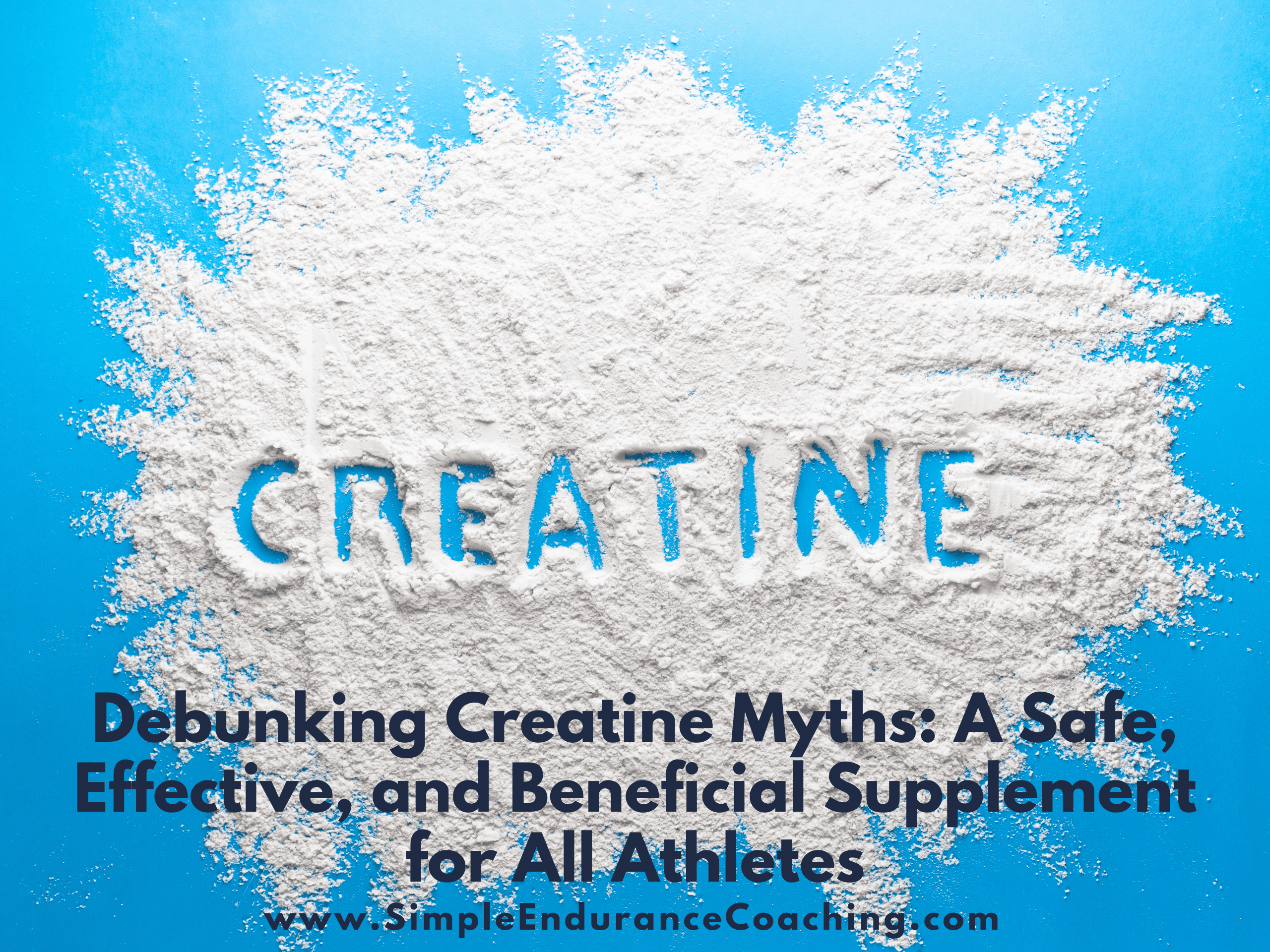Debunking Creatine Myths: A Safe, Effective, and Beneficial Supplement for All Athletes
Creatine is another ergogenic aid that can boost performance, lean muscle mass, and recovery at the recommended dose of 3 to 5g/day
Nutrition researcher Jose Antonio did a third review (see earlier articles on protein and caffeine) on misconceptions about creatine, typically obtained from meat and supplements..
I grew up with the idea that creatine caused weight gain, was a little dangerous, and only meant for serious bodybuilders – not endurance athletes.
But these may be misconceptions.Let’s see what Antonio and colleagues said about creatine supplementation:

1. Creatine may not lead to water retention
- Some studies suggest there is water retention due to cells expanding,
- But other studies suggest no water retention
2. Creatine is not an anabolic steroid
- Creatine can have similar benefits in terms of increased muscle volume, more repetitions, and more power.
- Creatine and steroids are completely different chemically.
3. Creatine at recommended doses does not cause kidney problems
- A case study in 1998 and some research studies showed possible correlated kidney damage, but these studies had data issues.
- The vast majority of research has concluded that there is no kidney damage with recommended doses of creatine.
4. Creatine does not cause baldness
- There is no research to indicate that creatine causes an increase in testosterone, which might be linked to a chemical that might cause baldness.
5. Creatine supplementation does not appear to cause dehydration or cramping
- Most studies that show some correlation between creatine supplementation and dehydration were anecdotal and didn’t show causation.
- Other studies suggest creatine users have fewer injuries, cramps, and dehydration that non-creatine users.
6. Creatine appears safe and well-tolerated by young people
- The vast majority of studies suggest creatine is safe and well-tolerated by adults.
- Creatine supplementation offers numerous benefits to young people, including increased strength.
- Children with head injuries and muscular dystrophy reported strength and cognitive increases after using creatine.
7. Creatine does not increase fat mass
- There may be an increase in body mass after creatine supplementation.
- However, this increase is not from fat.
- In fact, one study showed a decrease in fat mass when combined with a resistance strength program.
8. You don’t need to load creatine
- Initially, there was a protocol where you slowly loaded the creatine with large doses for a few days.
- However, regularly dosing creatine supplements with 3 to 5g/day does the job as well without the loading.
- If an athlete is trying to get as much creatine in during a short period, load with 20 to 25g/day for four to six days.
9. Creatine benefits older adults
- Creatine supplementation helps reverse sarcopenia, or loss of lean muscle mass, combined with a strength training protocol.
- Adults taking creatine and doing strength training also strengthened bone mineral content.
10. Creatine is not just for bodybuilders and weight lifters!
- Creatine can help with glycogen storage
- Creatine can improve recovery from exercise as well as help prevent injury.
- Athletes who risk spinal cord injuries or concussions might take creatine for its neuro-protective effects.
11. Creatine is good for both men and women
- Creatine supplementation may be beneficial during a woman’s period, or during peri, menopause, or post-menopause times in life.
- There’s even research that suggests creatine supplementation protects the fetus during pregnancy.
- Other research suggests creating supplementation helps improve symptoms of depression.
- Creatine helped younger women, combined with strength training, improve muscle mass and overall strength.
12. Creatine monohydrate is the optimal choice
- Creatine monohydrate is reported to bring about muscle mass, strength, and exercise capacity.
- There’s no current evidence that other forms of creatine are more effective.
- Creatine monohydrate doesn’t degrade and is stable for storage.
Here are three things to know about supplementing with creatine:
- A creatine dose of 3 to 5g/day is safe and tolerated by young and older adults, men and women.
- Despite common misconceptions, creatine does not cause water retention, kidney damage, baldness, dehydration, or fat gain when taken at recommended doses.
- Beyond increasing muscle mass and strength, creatine supports glycogen storage, aids recovery, improves bone mineral content in older adults, and may even have neuroprotective and mental health benefits.
Need more?
Unlock the secrets to mastering gravel racing with my FREE 24-page Guide to Gravel Racing! Get yours here.
SIGN UP FOR A FREE Virtual Coffee so we can discuss your goals, ask questions, and talk about making your endurance training more effective, fun, and Simple.
Paul Warloski is a:
- USA Cycling Level 2 Coach
- RRCA Running Coach
- Training Peaks Level 2 Coach
- RYT-200 Yoga Instructor
- Certified Personal Trainer




